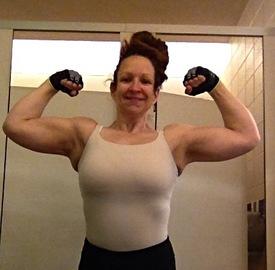Increase reps or increase weight?
Options

lindsaymarcin
Posts: 81 Member
Ok so I've been using the strength training machines at the gym for about 2 months now and in the beginning I asked the free trainer if I should increase weight when it started feeling easy and he said to start by adding more reps first. Well I took his advice for about a week and then began increasing the weight. My question is I have read many posts on here about "heavy" lifting and the benefits that can come from it. So is it better to do more weight and less reps or more reps with less weight? I think I am getting confused! I still have weight to lose, but would like to tone as I go instead of waiting.
0
Replies
-
More weight less reps0
-
1-6 reps with heavier weight for strength and 8-12 with slightly less weight for hypertrophy. anything over 12 is way too light in my opinion.
for instance, my heavy days are 3 sets 6 reps with 80-85% of my 1RM
my hypertrophy days are 5 sets 8 reps with 70-75% of 1RM
and i do an upper/lower split with a 4 day rotation. heavy lower, heavy upper, hypertrophy lower, hypertrophy upper.0 -
Aim to get exhausted after around 8 to 12 reps, or thereabouts.
I'd switch to a mostly freeweight-based strength routine instead of machines.0 -
thanks everyone!! Excited to start some serious strength training!0
-
More weight less reps
^ this0 -
I have been doing Strong Lifts 5X5 for a little over a month now and I quite enjoy it. You do 5 sets of 5 reps for each workout. There's only 3 workouts each day, 3x's a week, but they are full body workouts.0
-
I agree that if you can do more than 12 proper reps, the weight is too light. If the weight is so heavy that you can't do 6-8 reps it's probably too heavy for your purposes. You're a weight "trainer", not a competitive weight "lifter".
Another thing you can do in lieu of increasing the weight is to perform your reps slower. 3 full seconds to lift, pause a second, 3 full seconds to lower. You would be amazed at how well you can completely trash your muscles with relatively light weights using this approach.
Enjoy your lifting!0 -
A good general rule is to aim for 10-12 reps. If you can push out more than that then increase the weight. This has worked really well for me.0
-
more weight and less reps are great and will also prevent more joint aches0
-
Quick and easy to say, not so easy to verify.More weight less reps0 -
I'm another one who did StrongLifts 5x5. So very basic. Starts you off light to get used to form and then you just add to it on every work out.0
-
2-5 reps at 90% maximum weight you can lift is for increased strength/power; 5-8 reps at 80% max weight is for increased size (hypertrophy); 8-25 reps at 50-65% 1 rep max is for increased endurance.
to all the people saying "more reps is pointless": you're wrong. it's pointless for strength/size, but that's not what it's used for. endurance-training strengthens muscle fibers so that you can lift weights for longer amounts of time without getting tired. strength and endurance training are equally important, and you should really try to do both.0 -
You cannot "tone", and the myth of increased reps to "tone" is just that, a myth. Aiming for progressive overload is optimal. This is achieved through increased reps, increased weight, decreased rest time etc. A good starting point may be to work with a weight where you struggle to get 8-10 reps on your last set. Once you work up to comfortably getting 8-10 reps on your last set, increase the weight to where you can only perform 4-6 reps. Then from there, work to get to the 8-10 rep range. If you are more serious about weightlifting, and have upper/lower hypertrophy/strength days, then performing training splits as jlclabo stated can be optimal.0
-
The answer is always "MOAR WEIGHT!"0
-
It's not a myth at all. Use this guide, created by the University of Illinois, to work out how many sets/reps you should do, what weight and what your rest period should be: http://www.mckinley.illinois.edu/handouts/resistance_training_program.htm
as I said, you should aim to do both strength and endurance training.0 -
If the goal is to lose weight and not build muscle volume or increase significantly strength, then your trainer was right: more reps, and also smaller intervals between reps might be the way to go. Of course not ridiculously low weights and 1 million reps, or this is pure cardio. But e.g. as many reps as you can get in 40-60 seconds and then the next set after a brief (below minute) break, this is going to work great for someone trying to tone and get fit in general. If you are interested in lifting, getting to higher weights etc, then obviously the answer is more weights.0
-
Your rep range is dependent on your goals really. lower rep ranges 1-6 reps @ 80-95% of your 1 RM is optimal for strength and training your CNS for a heavy load. 8-12 reps with slightly lighter weight (in order to get in the reps) is optimal for hypertrophy. Beyond 12 reps and you are training muscular endurance...IMHO, you would be better served just doing some circuit type training for this rather than an actual lifting program.
All of the above have there place...just depends on your fitness goals...this is why it is important to establish such goals that go beyond calorie burning and losing weight...having independent fitness goals go a long way towards formulating a proper routine to achieve those goals.0 -
Are you on a specific program, designed to work all your muscles over the course of a week? Or do you just pick a machine at random and do a few sets?
I'd suggest, if you are not on a program, to find one that has a certain rep range/weight built in (and uses stuff you have available) and stick to that for the duration. You can find a plan here (for example) : http://www.bodybuilding.com/fun/find-a-plan.html
Of course, free weights are better than machines (machines don't use natural range of motion, isolate muscles too much), but the machines will get you started...0 -
It's not a myth at all. Use this guide, created by the University of Illinois, to work out how many sets/reps you should do, what weight and what your rest period should be: http://www.mckinley.illinois.edu/handouts/resistance_training_program.htm
as I said, you should aim to do both strength and endurance training.
I was referring to the belief that 20 or 30 reps will "tone" a muscle. Both strength and hypertrophy training are optimal, as I already stated.0 -
Always interesting.
Research will tell you that low rep/high weight and high rep/low weight will yield EXACTLY the same result in activating muscles fiber groups if your effort is exhaustion in the last rep or two. So if you did 8 reps at 20 pounds and your last rep was your hardest effort, or you did 20 reps at 5 pounds and the last rep was your hardest effort, studies show your muscle activation is within +/- 1%. The critical part is to make sure you rep to exhaustion on the last rep.
The caveat to this is, keeping the weight at a manageable level to ensure proper form (which we see lots of people maxing out on heavy weight with really crappy form, just to say they lift heavy), and to help prevent injury from said bad form.
All the best.
Edit to add, having someone to workout with will help maximize your effort by helping crunch out that important last rep.0 -
More weight less reps
^ This.0 -
This content has been removed.
-
bump0
This discussion has been closed.
Categories
- All Categories
- 1.4M Health, Wellness and Goals
- 396.8K Introduce Yourself
- 44.2K Getting Started
- 260.9K Health and Weight Loss
- 176.3K Food and Nutrition
- 47.6K Recipes
- 232.8K Fitness and Exercise
- 451 Sleep, Mindfulness and Overall Wellness
- 6.5K Goal: Maintaining Weight
- 8.7K Goal: Gaining Weight and Body Building
- 153.3K Motivation and Support
- 8.3K Challenges
- 1.3K Debate Club
- 96.5K Chit-Chat
- 2.6K Fun and Games
- 4.5K MyFitnessPal Information
- 16 News and Announcements
- 18 MyFitnessPal Academy
- 1.4K Feature Suggestions and Ideas
- 3.1K MyFitnessPal Tech Support Questions
















